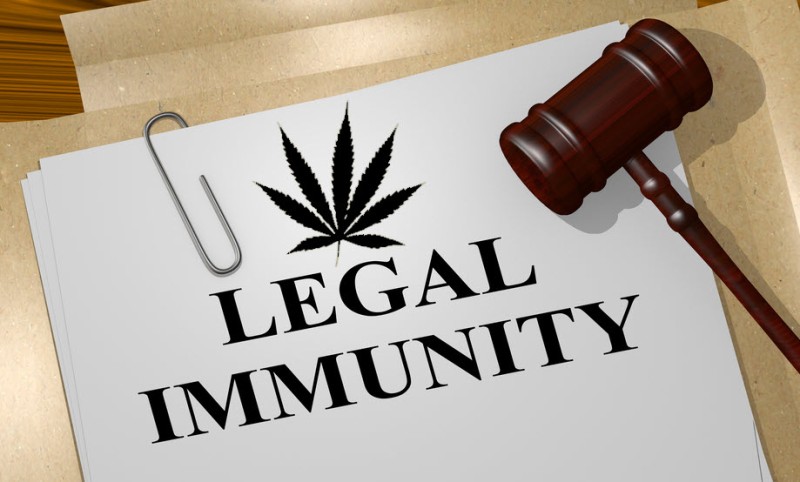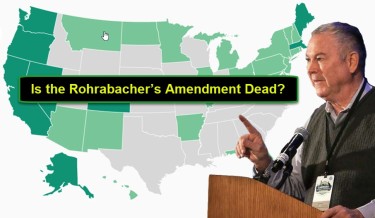
The counsel representing the alleged leader of an illicit interstate marijuana operation based in Maine asserts that legal marijuana enterprises are protected from federal prosecution under a Congressional statute. Lucas Sirois, accused by federal prosecutors of masterminding a criminal enterprise involving the lawful cultivation of marijuana under Maine's medicinal cannabis laws but illegal sales in multiple states, has pleaded not guilty to charges including drug distribution conspiracy, money laundering, fraud, and tax evasion. Sirois's defense aims to persuade the judge that a Congressional action protects him against prosecution.
According to the Bangor Daily News and MJ BIZ, Sirois's attorney contends that the Congressional statute shields him from legal consequences. The defense argues that the statute grants broad immunity to legal marijuana enterprises, even in cases where activities involve illegal aspects. By asserting Sirois's involvement in the marijuana industry and relying on this protection, the defense seeks to challenge the legitimacy of the charges brought against him. Ultimately, the court will determine whether Sirois's alleged actions fall within the boundaries of the Congressional statute intended to safeguard legal marijuana businesses from federal prosecution.
Legal Protection Claimed under the Rohrabacher-Farr/Joyce-Blumenauer Amendment
The Rohrabacher-Farr Amendment, a budget rider adopted by Congress in 2015, forbids the Department of Justice from interfering with cannabis businesses operating under state law. The Joyce-Blumenauer Amendment, as it is now called, has been extended in future Congresses, ensuring that firms having state licenses and operating within the bounds of state law continue to be protected. Regulators in Maine have verified that Lucas Sirois, who maintains a legitimate MMJ (medical marijuana) license despite being charged with a crime, is still operating.
According to the Bangor Daily News, defense attorney Timothy Parlatore filed a motion in federal court claiming that Sirois and his co-defendants should be protected under the congressional prohibition outlined in the Joyce-Blumenauer Amendment. Parlatore contends that an injunction should be granted since Sirois and his co-defendants' alleged activities were compliant with the Maine Medical Use of Marijuana Act. Federal prosecutors dispute this claim, claiming that Sirois and his accused accomplices are ineligible for the "safe harbor" protection offered by the amendment since they are unable to demonstrate that they were in substantial conformity with Maine law.
The federal allegations against Sirois and his co-defendants allege that they sold cannabis illegally and made over $13 million over six years. In addition, they are accused of filing fake tax returns, buying banking services through a complicated business structure, and buying politicians, local prosecutors, and police officials with bribes. Six of the case's other co-defendants have already entered guilty pleas. It's important to note that Parlatore, the defense lawyer defending Sirois, formerly served on the legal team of former President Donald Trump but departed for personal reasons during a probe into suspected improper handling of secret data.
Understanding Cannabis Legislation and Federal Protections
The legal framework governing cannabis in the US is convoluted and conflicting. Although marijuana is legal in some states, it is still prohibited on the federal level, creating uncertainty for consumers and firms in the cannabis industry. Despite state laws allowing it, federal law enforcement agencies can continue to pursue criminal charges for marijuana-related acts.
The Cole Memo directed federal prosecutors under the Obama administration, enabling states to create their marijuana regulation frameworks. The memo was later overturned by then-Attorney General Jeff Sessions in 2018, which caused more uncertainty for the sector and highlighted the need for comprehensive government legislation.
One recent development is the SAFE Banking Act, passed by the US House of Representatives, which aims to protect financial institutions serving cannabis-related businesses. However, a broader legislative solution addressing the conflict between state and federal cannabis regulations is still under debate.
Prosecution Challenging the Claim of Federal Protection
As the case unfolds, the prosecution challenges the alleged leader's claim of federal protection under cannabis legislation. This perspective raises fundamental questions about the legitimacy of such a defense strategy. Prosecutors scrutinize the alleged leader's reliance on cannabis legalization and argue that it does not provide blanket immunity for illegal activities.
Conflicting marijuana laws between the federal and state governments is one of the prosecution's main points. The federal government still considers cannabis an illicit substance, despite numerous states' legalization of it for medical or recreational use. According to the prosecution, laws contradicting federal regulations prevent the suspected leader from seeking protection. This casts doubt on the veracity of their assertion and the overall success of state-level cannabis regulation.
To build their case, the prosecution aims to establish criminal intent on the part of the alleged leader. They contend that the individual knowingly operated outside the boundaries of the legal cannabis framework, engaging in activities that surpass the protections offered by existing laws. By focusing on intent, the prosecution seeks to undermine the claim of federal protection, arguing that it should not shield individuals who knowingly violate the law.
Additionally, the prosecution must address concerns about public safety. They emphasize that allowing an alleged leader of a multimillion-dollar illegal operation to claim federal protection sets a troubling precedent. The prosecution contends that the alleged leader's activities pose potential risks to society and that providing federal protection in such cases could undermine law enforcement efforts and compromise public safety.
In light of these factors, the prosecution strategically challenges the claim of federal protection under cannabis legislation. By questioning the legitimacy of the defense strategy, they seek to dismantle the alleged leader's argument and demonstrate that their illicit activities go beyond what is covered by existing laws. Ultimately, the outcome of this case could have broader implications for how cannabis legislation is interpreted and applied in similar scenarios in the future.
Bottom Line
The complexity and inconsistency of cannabis regulations in the US are highlighted by the example of the putative boss of a marijuana ring who claimed federal protection under cannabis law. While marijuana is lawful under state law, it is still prohibited at the federal level, creating uncertainty and difficulties for users and businesses in the cannabis industry. The prosecution contests the assertion of federal protection, highlighting the inconsistencies in the law and casting doubt on the putative leader's compliance and motivation. This situation emphasizes the requirement for thorough federal legislation to resolve the discrepancies between state and federal cannabis regulations and offers clarity for the sector as a whole.







